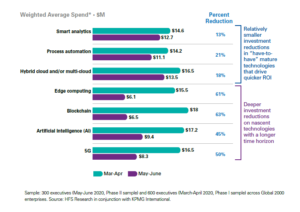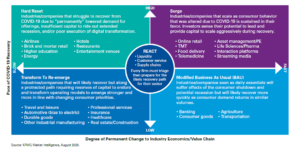
COVID Brings Clarity to Emerging Tech Investments

(OSORIOartist/Shutterstock)
The novel coronavirus is having a devastating impact on people, killing hundreds of thousands while sickening tens of millions more. The ban on in-person get-togethers has disrupted the lives of billions and cost trillions in lost business. But the crisis appears to be having a clarifying effect on the technology investments of enterprises, notably around their digital transformation efforts. However, that clarity isn’t necessarily translating into increased spending.
According to a new report unveiled today by KPMG, mature digital-first companies are thriving during COVID-19. Meanwhile, companies that have failed to execute digital transformation “are on a downward spiral, losing customers, market share, and employees,” the company says in its new report, which is called Enterprise Reboot.
Cloud computing has floated to the top of the list of “must have” technologies for getting through the pandemic. Public clouds were growing solidly prior to the coronavirus outbreak. But movement to the cloud has stepped up considerably under COVID-19, according to the report, which found that 56% of survey respondents viewed migration to the cloud as an “absolute necessity.”

The top business priority is survival, but digital transformation is not far behind (Monkey Business Images/Shutterstock)
The work-from-home mandate that many companies have instituted to stop the spread of coronavirus is fueling the movement of applications and data to clouds, including multi-cloud and, especially, hybrid cloud environments. “Instead of piecemeal migrations of small datasets,” KPMG writes, “many companies are now intent on moving an entire function’s data to the cloud at scale.
AI and analytics are also viewed as potent difference-makers that can help companies gain share post-pandemic. In particular, the widening digital footprint created by the cloud migration and work-from-home has increased the possibilities for predictive analytics, KPMG says.
“As people start to leave a much larger digital footprint compared to what was normal and expected one year ago, advanced analytics can play a major role in an enterprise’s ability to understand and take action on customer behavior,” David Slánský, a partner for data analytics for KPMG in the Czech Republic, says in the report.
While investments in cloud, AI, 5G, blockchain, and low-code development environments are looked on as ways to thrive post-pandemic, companies are not necessarily increasing investments. In fact, KPMG’s surveys found that planned investments in these technologies have actually declined as the viral pandemic plays out. KPMG recorded a 13% average reduction in survey-taker’s planned spending for smart analytics between the first survey (taken in March and April) relative to the second survey (taken in May and June), for example. Other technology categories saw similar reductions.
“Although some new technology spending is temporarily frozen in some sectors, our research shows that the pandemic is increasing investment clarity,” the report states. “Budget pressures and operating
model stressors are forcing organizations to prioritize areas that bring important near-term benefits over technology investments with a longer time horizon to value realization.”
While technology is core to digital transformation, it’s important to keep in mind the role that people and processes also play. With that said, many companies are in survival mode at the moment. KPMG found that about 40% of survey respondents expect to halt investment in emerging technology as a result of COVID-19. Only about 13% are planning to significantly increase investments in emerging tech.
Tim Denley, the partner in charge of solutions for KPMG in Japan, said the pandemic has driven a huge change in the perspective and focus around technology.
“For the most part, it’s helping refocus efforts in the places that will have the most value,” he says. “Enterprises are doubling down and even accelerating investments in core technologies such as cloud, AI, and automation given the uncertainty of the environment right now.”
Not all industries are impacted equally by COVID-19. Airlines, hotels, higher education, restaurants, and entertainment venues have been hit the hardest, and will need a “hard reset” to digitally transform themselves to survive in an era of permanently depressed demand for their products or services, KPMG says.
Meanwhile, online retail, food delivery, telemedicine, asset management, life sciences, and streaming media companies have seen increased demand from consumers during COVID-19.
KPMG worked with HFS Research to conduct two surveys, which took place between March and June 2020 and involved 900 technology executives working at Global 2000 enterprises with at least $1 billion in annual revenue in North America, Europe, and Asia.
Related Items:
Why Investing in Your Team’s Data Culture Could Be the Most Important Money You Spend
VC Firms Invest Heavily in AI, Pushing Hype Bubble Bigger
VC Funding for AI Slows, But Don’t Expect Another AI Winter Just Yet

































